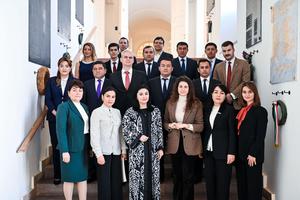Between February 24-28, the Institute for Public Administration Further Training and the Directorate General for International Affairs of the Ludovika University of Public Service (LUPS) organized a five-day intensive training for public officials from Uzbekistan, focusing on Hungarian administrative practices. During the week-long Training on Hungarian Public Administration, participants explored topics such as Hungarian public administration, innovation, digitalization, and water management.
At the opening ceremony, LUPS Rector Dr Gergely Deli highlighted in his speech that Ludovika is an outstanding interdisciplinary academic institution in Hungary that trains professionals for the national public administration. "We are committed to strategic education and research that address contemporary challenges," he stated. He explained that LUPS contributes to the advancement and application of knowledge through research institutes and working groups. "We consider it crucial that our students not only acquire theoretical knowledge but also gain practical experience and insights into global events," he emphasized. He also stated that strengthening existing international relations and establishing new ones are of paramount importance for the university through diplomacy, scientific work, and innovation.
H.E. Oybek Shakhavdinov, Ambassador Extraordinary and Plenipotentiary of the Republic of Uzbekistan to Hungary, stated that this conference contributes to the methodological framework that enables Uzbekistan to develop valuable strategic cooperation. He highlighted Hungary as a key strategic partner and emphasized that strengthening the relationship and organizing such training programs reinforce mutual respect and support. "It is extremely important for us to understand how public administration operates in Hungary," he remarked. "Central Asia faces numerous global challenges, and both the European Union and Hungary play a crucial role in supporting the region," the Ambassador added. He also pointed out that digital transformation is a significant aspect of development, and Uzbekistan has made great efforts to become a leading digital innovator in the Central Asian region.
In her speech, Ms. Liliana Śmiech, Director General for International Affairs at LUPS, emphasized that the fruitful relationship between Hungary and Uzbekistan reflects not only the bilateral partnership but also Hungary’s broader cooperation with the Central Asian region. "This visit represents another step in strengthening our collaborative efforts," she stated. She noted that cooperation is not only about formal agreements but also about fostering long-term relationships built on mutual trust and understanding. This conference underscores the importance of dialogue, deeper cooperation, and strengthening relations between nations in governance, water management, and municipal affairs. The Director General also highlighted the significant diplomatic, economic, and scientific advancements made in recent years between the two nations. She pointed out that education is one of the key areas of collaboration, as Hungary and Uzbekistan’s public administration institutions face similar challenges—adapting to a rapidly changing global environment, improving governance structures, and training the next generation of leaders. "Through initiatives such as academic and vocational exchange programs and joint research projects, we not only strengthen institutional ties but also build personal and professional cooperation," she added.
Mr. Balázs Klotz, Director of the LUPS’ Institute for Public Administration Further Training, expressed hope that the conference would contribute to further strengthening Hungarian-Uzbek relations. He outlined that the multiday professional program would present the workings of Hungarian public administration, with special emphasis on the role of digital services and the importance of diplomacy and cooperation.
Following the opening ceremony, the Uzbek public officials participating in the training were first introduced to Hungary’s constitutional system and fundamental rights. On the second day, the training continued in Püspökszilágy, where participants gained first-hand experience on how a model Hungarian municipality operates. They visited key institutions of the settlement and learned about successfully implemented projects funded by grants.
The third day’s program continued in Budapest with presentations on Hungarian regional development. The Uzbek delegation also visited a Government Office, where they observed the practical aspects of administrative service delivery. This was followed by an official visit to the Hungarian Parliament, and the day concluded with a reception at the Uzbek Embassy in Budapest. During the reception, both the Uzbek Ambassador and Liliana Śmiech emphasized the significance of this training program in strengthening and maintaining bilateral relations between the two countries.
On the fourth day, the delegation focused on Hungarian water management, with lectures delivered by faculty members of LUPS’ Faculty of Water Sciences. Later, the training continued at the Danube Institute, where its Executive Director István Kiss and International Director Kristóf Veres provided insights into Hungary’s history and foreign policy.
On Friday’s closing day, the participants received their certificates from Liliana Śmiech and Balázs Klotz. In her closing speech, the Director General stated that this training represents a major step forward in diplomatic relations between the two countries, and upon returning home, the participants would act as “ambassadors” of Hungary, having gained valuable insights into its public administration system. The head of the delegation, Muzaffar Latibov, emphasized in his concluding remarks that they had acquired an immense amount of valuable knowledge over the past week and expressed deep gratitude to the Ludovika University of Public Service for making this program possible.
Text: Éva Harangozó
Photos: Dénes Szilágyi
